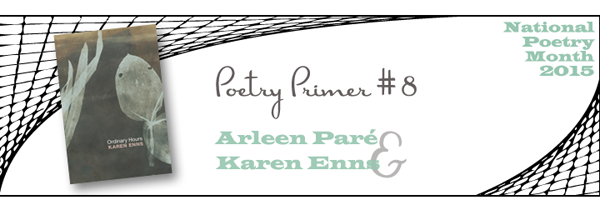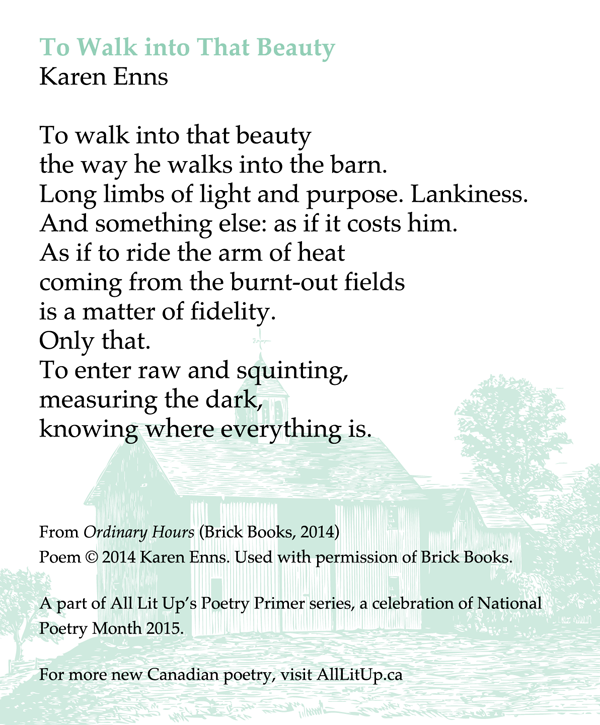|
The Rusty Toque is pleased to cross-post selections from the All Lit Up blog's Poetry Month series Poetry Primer in which poets from across the country select their favourite up-and-coming poets. Visit the All Lit Up blog for this and other Poetry Month treats! Award-winning poet and novelist Arleen Paré does us the honours of selecting our next emerging poet. Hailing from Montreal, then a long stopover in Vancouver as a social worker and administrator, and now, residing in Victoria, Paré's works have garnered the acclaim of the Dorothy Livesay BC Book Award for Poetry and the Victoria Butler Book Prize. Her latest book of poetry, Lake of Two Mountains (Brick Books, 2014), won the 2014 Governor General's Literary Award for Poetry. The jury noted that it was a poem of "sustained beauty, an almost monastic meditation on the overlapping centres of human and natural reality." Arleen Paré has chosen fellow Brick Books poet Karen Enns as an emerging poet to watch, and with good reason. Also residing in Victoria, but having grown up in a Mennonite community in southern Ontario, Enns works as a private piano instructor and writes poetry of notice: her first collection, That Other Beauty (Brick Books, 2010), was shortlisted for a Gerald Lampert Award. Her most recent collection, Ordinary Hours, explores her Mennonite childhood and the community's original diaspora from Russia. Get lost in the "sublime pleasure" (review, Michael Dennis) of Enns' poetry with an excerpt fromOrdinary Hours, below. *** Arleen Paré on why she selected Karen Enns: I have chosen the wonderful Victoria poet, Karen Enns, to showcase in the LPG project for National Poetry Month because she is simply one of the most evocative, tender, lyrical poets to be recently published. She uses words economically, wisely, precisely. She writes from long contemplation, out of silence about music, sorrow, hauntings. Her poems are intelligent and open, but quiet with understated emotion. They are political too. Enns grew up in a Mennonite family/community in southern Ontario. Her community has a history of harsh exile from Russia for their Mennonite beliefs. She writes poignantly about the results of this sort of exile. The loss, the pain. This is the reason her poems are important in the general Canadian contest: they speak of an immigrant population that receives little attention. She draws our attention to it. Beautifully. Karen Enns on why she writes poetry, and who her influences are:
I've often wondered how a musical phrase, which is really just the particular order in which a series of pitches of various lengths are arranged, can be capable of such emotional power. One note placed differently or held for a shorter or longer period of time can change the entire effect. A line of poetry, or a group of lines, works the same way. That something so briefly heard can stay with us so long, that we remember lines of verse or music our entire lives, or that we remember the exact place and time of our first hearing them, is hopeful. This is reason enough to write poetry. To me, the craft of making the poem after the initial draft or fragment is completely absorbing: putting it together, taking it apart, cobbling and splicing. And beyond that — the compression and restraint that go into taking what seem like enormous complexities and distilling them into the one metaphor or image that clicks. Who wouldn't want to write poetry? It's been said by others before me that writing a poem is an act of faith. I would add that it can also be a very private act of faith. Not long ago I was walking along a beach in Vancouver and noticed a carver who had displayed his work on a low rock wall. Further along that wall he had set three stones of various shapes. They seemed so carefully chosen, so exquisitely placed, to catch the light in such a way that their shadows became as much a part of the form as the stones themselves. I don't know if anyone else noticed — people were walking and jogging by — but my belief that no one else was aware of the particular slant of those particular shadows in that moment was, I think, somehow important. The artist had created something in solitude and offered it to the private space of my attention. It was exclusive and generous at the same time. I like to think of writing poetry in this way. It's difficult to say what influences are at work in one's own writing. The sounds we're surrounded by during our childhoods stay in our ears: the music, our first language, the stories and verses we hear, and the distinctive noise of our geographical and cultural landscapes. In recent years I've found myself drawn to the work of Polish poets: Zagajewski, Milosz, Szymborska, Herbert, and Rozycki. It may be that their poetry, so haunted by the historical traumas of the 20th century, carries echoes for me; it resonates with the culture of the displaced and traumatized Russian Mennonites I grew up among. I feel the responsibility of the art form through knowing their poems. *** Follow along with our Poetry Primer series all April long or get the full collection of featured poetry plus a poem from each of our established poets in our new chapbook, ibid. Get a free ebook copy if you buy a collection of poetry from All Lit Up during National Poetry Month. |
RUSTY RECOMMENDS
In the spirit of supporting writing—especially writing that's off the radar or under appreciated—we want to know what you are excited about reading and what you think we should be reading. Your recommendations should be paragraph length (approximately 250 to 300 words) and should briefly summarize the book and detail why you are recommending it or why you think others should read it. Send our reviews editor Aaron Schneider your recommendations of Canadian and International fiction and poetry. Please write "Rusty Recommends" in the subject line. Include your (250 to 300 word) recommendation, name, and a link to your website, blog, or social media site (if you have one). Selected recommendations will be posted on our website. We will contact you if your recommendation is selected for publication. There is no payment for publication of Rusty Recommends. Archives
July 2015
Categories
All
Rusty Recommends Editor:
Dr. Aaron Schneider completed a PhD. in Canadian Literature at Western University where he currently teaches courses in public speaking, political rhetoric and Canadian Literature. He is excited about bringing together his interests in World and Canadian Literature. He is the co-founder and co-editor of The Rusty Toque and Western's online student journal Occasus. |



 RSS Feed
RSS Feed
